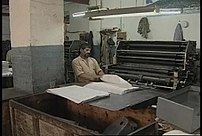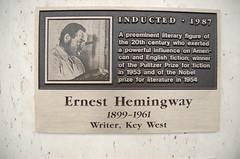by: Steve Manning
Here's a string of tips on writing a book. They're brief, succinct and very useful. These tips on writing a book have been designed to get you up and writing your book as quickly as possible.
They'll help you start writing, continue writing and finish writing your book. Your manuscript will be ready for the agent, or the publisher, or on its way to self publishing success.
Here are your tips on writing a book: Image via WikipediaYou can't start writing your book and continue writing until the book has been written. It's too big a job. It's going to take you a few days. Probably a couple of weeks.
Image via WikipediaYou can't start writing your book and continue writing until the book has been written. It's too big a job. It's going to take you a few days. Probably a couple of weeks.
People take years to write their book because they go at the task sporadically. You've got to write every day. If you don't, you find yourself having written nothing for months at a time.
Your book writing success or failure depends largely on the outlining process. Create an outstanding outline for your book and you're writing task becomes easy. You should know exactly what happens on every page before you start writing your first word.
If you think you can write your book by being spontaneously creative as you write, you're wrong. You're welcome to try, just about every novice author does. But I'd bet money it won't work for you. Create the exhaustive outline.
Your outline should consist of a series of questions: What does the library look like, how is she dressed, why does he feel so angry, what does she do when she reaches the house. It's simply easier to write in response to a question than it is to write in response to a statement.
Spend a short time writing to answer each question. Just a few minutes. You don't want this to become a protracted bunch of puff. You want real story.
Don't stop until the book is finished. There's a real tendency to stop and edit the work that you've just completed. After all, editing is a lot easier to do than the actual writing. So you can feel that you're still working, but it won't be as difficult. Don't do it! Keep writing until the book is finished.
Give yourself a period for writing and stick to that amount of time come hell or high water. Even if it's just 15 minutes a day. Initially you're just going for the discipline. Eventually you'll get the writing quality as well, but the discipline is most important factor for the completion of your work in the shortest amount of time possible.
Doing research for your book writing can be fun. But don't do it until after the book is written. If you come to a point where you've got to get a piece of information that you don't have in you head, just put down an asterisk and keep the flow of the book going. After the manuscript is finished, you can look back for all those asterisks and get just the information you need.
About The Author
Steve Manning is a master writer showing thousands of people how they can write their book faster than they ever thought possible. Here's your free Special Report, http://www.WriteABookNow.com/main.html
Techniques to Make Quick Money Writing Articles
| Affiliate Programs, Web search engine, Webmaster Resourcesby: Jo Mark
For the most part, article marketing is a long distance race, not a sprint. By writing articles and submitting them daily, you will increase the amount of traffic to your site and see improved profits (as traffic builds). The more you submit, the greater your benefit. But, even if you submit ten articles this week, don’t expect to retire any time soon. As I said, it is a long distance race.
However, there are techniques that you can use to make some quick money writing articles. From time to time, certain niches will capture the public’s attention and there will be a flurry of interest in that sector. If you discover the trend, you can make some quick money with your articles. Following are several ways to profit writing articles:
It all starts out by doing some research. Look for niches (or products) that everyone is talking about. Forums are a good place to find this type of information. Hang out in these forums and look for postings that have a large number of responses. Read through a number of these items. If it related to a single product or niche, you may have found an exploitable subject.
You can also find hot products doing research on Ebay. Search for popular products that have sold well during the past 2 weeks. If you find several products that are selling really well and are related to a common theme, you may have found a hot area to exploit with your articles.
Lastly, check your bulk emails. This is one my favorite (and easiest) ways to find hot topics. When you see an explosion of emails on one subject, it is a pretty good bet that the niche is hot. Image via Wikipedia
Image via Wikipedia
Once you find a hot topic, do research to find an affiliate program that is offering a product in the same area. Research the topic so that you can write knowledgably about the subject. Develop effective article titles using keyword research. Make sure to include two or more keywords in each title, because you will want the search engines to pick up your article. Write five to ten articles on the subject. Submit one to two articles per day to the largest article directory sites. Make sure your article contains a link to the affiliate program you found previously. Or, you can direct readers to your site and re-direct them to the affiliate program from there.
If the niche remains hot for some time, you can make a fair amount of money from this technique.
When you write articles, be sure to keep readers in mind. Studies have shown that most Internet readers tend to scan a page to find the information they are looking for, rather than to read the full page. This means to have good titles, many subtitles, and make use of bullet points to help readers to scan the page. Viewers prefer a site like this that are easy to use and will be more willing to come back to your website time and time again. The more that your readers back, the more opportunities you have to get them to click on each of your affiliate links. Failing to write your articles in this way, or to get them written in this way, can make the visitor away before they even have a chance to see what you have to say or know what your affiliate links are all about. Holder articles organized as recommended will keep the visitors back and make it possible for it to continue to make money for you.
When you select an article for your site, ensure that there is a length that is optimal for search engine optimization efforts. Articles that are as short as 200 words or as long as 500 words should fit into this category. Although the search engine optimization is not your goal, it is still a good idea to keep your articles in this length of your reader's sake. They are unlikely to be finished with your side if it is longer. This could leave them Kith only half of the information you want them to have or to leave them with the impression that your site is too "wordy". Most Internet readers do not read a Web page that they would make a book, so the shorter the better. Even if it means to divide up a long idea to 4 or 5 pages. Be sure to label them so that the reader can pick and choose which parts they want to read or so they know what will be next to help them decide whether they want to continue reading.
Be A Rich Writer, Join Paid Blogging Program
| Blog, Economics, Home, Kids and Teens, Microsoft Money, Personal Finance, School Time, Social StudiesAre you a writer and blogger? Make your hobby to turn money coming to your wallet. It’s very simple way job. Please chose product list from ">Bloggerwave and write simple review in 50 words. Yes, only 50 words, it’s true!. You can make money every day and every time with paid review programs.
E-book: Become A Model
| Autos, Makes and Models, Miley Cyrus, Playboy, Recreation, Vanity Fair, Vogue, Volkswagen
The best thing about being a model can you get from e-book Become A Model. Imagine your beautiful photos taken for Vogue or Playboy magazine. Wow! Read this book quickly.
The other way to become your dreams come true is to join Beauty contest from http://www.lookoftheyear.com. Are you interest to this chance, young girl? Read More..
Read More..
 Image by louder via FlickrTraditionally, journalists have more or less worked alone. Journalists in both the news business and feature writers for magazines typically will develop their stories, dig up their leads, conduct their interviews and draft the final product themselves. In the newspaper business, major stories will sometimes become collaborative efforts where several reporters are working on aspects of a story and their work is edited into a single piece, published under multiple bylines.
Image by louder via FlickrTraditionally, journalists have more or less worked alone. Journalists in both the news business and feature writers for magazines typically will develop their stories, dig up their leads, conduct their interviews and draft the final product themselves. In the newspaper business, major stories will sometimes become collaborative efforts where several reporters are working on aspects of a story and their work is edited into a single piece, published under multiple bylines.
Communicating with a journalist was generally a haphazard affair, placing a call to a switchboard or desk and leaving a message. Today, major newspapers all have websites and provide email addresses for most of their journalists and nearly all of their columnists. People who write columns and opinion pieces are generally more open to communicating with the public because their work is often designed to generate controversy and feedback is important. Occasionally columnists will find ideas for new topics in the email traffic they receive, or will write about the heavy response they received on a particular piece.
A journalist with some initiative can take this communications process one step further by setting up a personal website. That site can serve several purposes: all of them require some work. The function of the site depends, to some degree, on the amount of time the journalist is willing to devote to it. A working reporter may also have to negotiate permission to engage in some online publishing of his own with the editorial staff of the paper or magazine that employs him.
Internet blogs have made some opinionated people in this country powerful and well known, just by virtue of their daily journaling. A working journalist could set up a blog for which he could provide occasional entries, relating to his work or to other news stories or totally unrelated subjects. The value of a blog is that it provides the opportunity for open dialogue among all who wish to log on and participate. Name recognition can be meaningful to some journalists and blogging is one way to develop "viral" recognition by inviting communication. Many people will be attracted to the opportunity to communicate with someone who gets paid to publish.
Blogs can develop story lines for topics for journalists, particularly columnists and feature writers. They can help a professional writer build a persona that doesn't enter into the straight journalism he produces on the job. A personal blog is a way to build a public and well rounded profile that the constraints of a traditional journalism job don't usually allow.
A personal website can also provide the journalist an opportunity to showcase a "profile" of work that is unrelated to the job, or at least has gone unpublished by the employer. Here again, there is a fine line between what the journalist can do online - which is essentially public exposure - and what the requirements of exclusivity on the job may be. But if a journalist has ventured into fiction, a personal website is a great way to put it out there for exposure.
If the goal is a publishing opportunity for fictional work, the website may be a way to short circuit the formal submission rules for fictional work that magazines and book publishers maintain. An established journalist is already a professional writer. Asking a book publishing editor or potential agent to look at product posted on a website is much easier than engaging in the formal process.About The Author
Madison Lockwood is a customer relations associate for http://www.apollohosting.com. She helps clients understand how a website may benefit them both personally and professionally. Apollo Hosting provides website hosting, ecommerce hosting, & VPS hosting to a wide range of customers.
 Image by geishaboy500 via FlickrAll speakers and writers who become great speakers and writers have two needs.
Image by geishaboy500 via FlickrAll speakers and writers who become great speakers and writers have two needs.
To be a great speaker you need to have:
1) a real and valuable knowledge of the subject you are addressing, and
2) a burning desire to share what you have to offer with others.
To be a great writer you need to have:
1) a real and valuable knowledge about the topic you are writing about, and
2) a burning desire to share what you have to offer with others.
In other words, be a good storyteller so people will listen to or read your stories.
We all must begin where we are at, whether we think we can become an internet article writer or not.
So what exactly is good writing? The best writing glides along the ice like a speed skater in a 1,500 meter race. You ride on his effortless stride, you marvel at his form, you feel his intensity and sense of controlled urgency, you appreciate his sense of competitiveness, you find yourself with him, stride for stride, measuring his distance from the leader of the pack, wondering if he can actually win, suddenly you lose control and jump into the race, you lean as he leans going around the curve, you wonder if he has what it takes to close the gap, your attention becomes riveted as he begins to narrow the margin, your heartbeat increases as he gains ground, you are glued to the moment, and then he puts on a final sprint, finally draws even, and wins by the blink of an eyelash! My God, you were there. When he mounts the awards stand and the flag of his nation rises, you rise with it. He was your choice, and he won!
Is it any wonder that athletes have such a strong following among spectators? Athletes become our heroes in any vicarious way possible. We wear a jersey when we watch the game. After the game, we play a pick-up game with our kids in the back yard. We love the feel of being in the thick of the competition, and winning.
Switching back to our main topic, what exactly is good writing?
Some people think a good sentence should be short and simple.
To the point.
Obvious.
In the first example above, the sentence goes on and on and on (168 words!), and yet you kept reading.
Writing can be either way and be effective, and there are Pulitzer Prize winners to prove it. For simple writing with short sentences, read Ernest Hemingway’s "The Old Man and the Sea." Hemingway won the Pulitzer Prize and the Nobel Prize for Literature. For sentences that go on and on and on forever, read William Faulkner’s "The Sound and the Fury," it is filled with long, convoluted sentences. Nonetheless, Faulkner, like Hemingway, also won the Pulitzer Prize and the Nobel Prize for Literature. Both were legendary novelists with opposite writing styles, and therein lies the easiest way to become an articles writer.
What is important is developing a style of writing that you are comfortable with. Even more important is getting your thoughts, some thoughts, any thoughts, onto your monitor. Until you put the letters on your keyboard onto your monitor, you are not a writer. The moment you do you have the potential to be an articles writer.
Once you have a sentence, any sentence, in front of you, you can pick it apart and make it better, because you have taken the thought out of your head and into the workplace of improvement. Write something on your monitor and it becomes manageable; try to formulate the perfect sentence in your head before you put it on your monitor, and your article may never get written.
The frustration of trying to write the perfect sentence brings on writer’s block, the inability to put your thoughts into meaningful sentences. Forget about being an articles writer, just get started and you will become one.
Go ahead, start. Begin now. Write anything down, and then make it better.
You are now on your way to becoming an internet article writer.
Copyright 2006 Ed Bagley
About The Author
Ed Bagley started writing for money at 16 and in the next 45 years was an investigative reporter, sports editor and mangaging editor for daily newspapers, newspaper publishing company owner, niche book publishing company owner, personal marketing specialist, and now is a mentor, consultant, confidant and an internet marketer. Visit Ed Bagley at... http://www.Internet-Marketing-NorthWest.com
Web writing is a good gig. I make $30 an hour writing at home. And although I sometimes wish my only companion during the workday were not run on electricity, I like my job. I wake up most mornings excited about what I am doing.
Steps to Getting Started Writing for the Web
For those of you who would like to write for the web, here are some things I did to land a job that you should be able to do also:
1. Get general writing experience. I wrote a little food column and a few feature articles for our local paper. This is a paper where the most interesting sections are the obituary and the arrest reports, so it doesn’t need to be the Washington Post.
2. Learn everything you can about search engine optimization (SEO). SEO is what needs to be done to have the search engines like a Web site, i.e., give it high ranking. The book I read was Search Engine Optimization for Dummies by Peter Kent. Although anything published on computers is generally obsolete by the time it is published, this book is still relevant and will give you a good idea what SEO is about. I would start with the book and then look on the net for additional, updated information.
3. Learn how to write for the Web. In addition to writing in a way that attracts the search engines, Web content writers need to write for the impatient folks who will surf the net. All of the information you need to learn how to so this is on the internet. It can mostly be boiled down to the following: a) surfers scan and don’t read; b) use bullets, lists, and bold to set off the important points (and the key words for SEO); c) keep it short (between 250 and 600 words) and relevant; d) surfers want information not a lot of marketing mumbo-jumbo; e) write short paragraphs; and f) use headings, preferably with key words in them.
4. Learn Basic HTML/XHTML. The content you write for the Web is coded with HTML/XHTML. If you are going to be the one to actually add the content to the Web site, you will most likely be using a content management tool (CTM). These usually require the user to manually code in some HTML/XHTML. I would suggest going through a book that will take you through the process of writing XHTML. You will also need a book for a reference, which may or may not be the same book you used to learn the basics. There are also tutorials at www.w3schools.com that are good. In fact, you may want to start there and see how it goes.
5. Write the content for a Web site, even if you don’t get paid. You have to start somewhere. Ask non-profit organizations, relatives, and friends if they would like you to write Web content for them.
6. If possible, write for an industry you are familiar with. If you know the industry, you will have a better chance getting a job writing for the industry. The more experience and/or education in an area the better.
7. Write a sample Web page to send with your resume. When you send out your resume, include a sample Web page, preferably one relevant to the industry. For my Web page, I researched a topic for a couple of hours on the Web and then wrote the page using everything I had learned about Web writing and SEO. Throughout the sample Web page, I made notes in red explaining what I was doing. For example, “[Note: The search engines give more weight to bulleted items.]” or “[Note: Important key words should be used at the top of the page, preferably in the page title.].” This is, I think, the best way to let people know you have a firm grasp of writing for the Web and SEO.
Sample Web-writing Page
I hope this has been helpful to some of you. I have built a page on the Web site I am working on to give you an idea how to write a sample web page. The page is a food poisoning attorney/lawyer page, and it can be found at www.pritzkerlaw.com/Food_Poisoning_Attorney. Look for the following and think about where you would make your notes in red:
• Key words in page title (in light orange)
• Key words in headings for SEO
• Headings for easy scanning
• Bullets to set apart important information
• Content-rich links (no “click here” links)
• Content-rich links for scanning purposes
• The words “free consultation” in bold to make sure someone who is scanning the page will see them.
The Web site is still a work in progress. I have to work around a bad content management tool that doesn’t write valid code, doesn’t give me access to the key word meta content (an SEO issue), and unduly limits the length of my description meta content (another SEO issue). I also have to use caution when writing because, in addition to copyright and other legal issues, we have to consider legal ethics. Also, Fred Pritzker, the excellent lawyer I am working for, wants the site to be a legal resource and not obnoxiously over-sell him. I am still learning how to balance everything. For example, the page I sent you to above is quite heavy on marketing. Most pages, however, are actually a bit too long and are almost purely informational (See, for example, www.pritzkerlaw.com/ecoli).
About The Author
Kathy Will is a freelance Web writer who can usually be found shivering at her computer in Minnesota. Her current project is http://www.pritzkerlaw.com, a legal resource for injured people.
You are free to publish this article on the internet. You must, however, not alter any of the content, give the author credit, and provide a live link to the Web site I am working on, www.pritzkerlaw.com. You may publish this in segments if you wish, but you must adhere to the above.
© 2006 Kathy Will

In this free e-book, “Book Writing for Fun and Profit,” you'll discover everything you need to know to quickly and easily achieve your dream of becoming a respected author!
Just take a look at some of what you will learn:
* How to choose a proven subject for your book that will guarantee people will want to buy it – people never change. Nor do their basic desires. They've existed for thousands of years and will continue to exist for thousands more. That's good for you – as an author. Discover here what people want and how to profit wildly from their desires!
* How to choose a topic for your book that will make writing seem like anything but work – follow these tips and you'll soon be looking forward to writing everyday … even if you've always hated it in the past!
* How to brainstorm the most profitable title for your book – these tips could literally be the difference in you producing a best-seller or a bust!
* How to create a powerful outline for your book - even if you hated English class and never paid attention when the teacher discussed this boring subject!
* The most productive way to find great content for your book – you may be very surprised at what you read here!
* The simple way to get experts on your subject to contribute content for your book – these tips will save you time and effort and put you that much closer to having your own profitable book!
* The secret that allowed me, the author of this book, to make $10,000 in just in less than 45 days – and how you can use the same technique to create a book and explode your own income in no time!
* And much, much more !
Download free ebook
Memoir Writing Help, Memoir Writing Ideas
| Anecdote, Article, Arts, Glossary of cue sports terms, Idea, Publishing, Reading, Short story Image via WikipediaWhere Do I Get Ideas?
Image via WikipediaWhere Do I Get Ideas?
That's the most common question I get from fellow writers looking to break into article marketing. The truth? Steal them.
Yes, you literally steal ideas and twist them a bit to make them fresh – make them yours.
That leads to another question, how do you make old ideas yours so that they're fresh, new and – dare I say – revolutionary?
Actually, it's not as tough as you may think. Here's a quick and easy formula I use for turning old content into something new:
1.Find an old text. Dust off articles, books and home-study courses from your industry and find content that may be useful to your audience. I know what you're thinking. “What about copyrights, Lisa?” Good question. Unless you plan to republish entire blocks of text from the source material, you won't run into any problems. See the following points to find out why.
2.Pull out key points. Look at the information and pull out the salient points that really jump out to you. I usually highlight the points that are exciting to me, and then I re-phrase those points by putting them into my own words.
3.Add your expertise. Under the key points, you'll want to share a bit of advice and expand on the main idea. The best way to do that is to share some of your experience. Tell an anecdote or story from when you handled a similar situation. For instance, when I was an editor at a large business-to-business newsletter publishing company, I often took several articles, pulled out the main ideas and combined the information to create one short, coherent article. You can do the same.
4.Raise your voice. To make sure you're using the source material as a point of reference only, consider reading your final article aloud. If it doesn't sound like something you'd say to a friend or colleague in the industry, re-write it. In my experience, that's the only way the article will ring true with your readers. Plus, you'll steer very clear of the copyright police – who, frankly, aren't really watching anyway. It's your audience you want to please.
Bottom line: Maybe they have heard this information before, but they haven't heard it from YOU – a battle-tested, shooting straight-from-the-hip expert.
It really is that simple. But it does take some practice. Find two long articles from your industry and boil them down to four or five key points. Then simply expand on those points by sharing stories and anecdotes from your experiences.
Try it and let me know how you make out. This is the best way to find so-called “fresh ideas.” When you look at it this way, new ideas are everywhere.
About The Author
Lisa Sparks, marketing expert, is finally revealing every article writing trick, tip, idea, strategy and tactic she's learned over her 16-year career as an editor and marketing geek. More free advice at: http://www.ArticleSecretsRevealed.com. Read More..Article Writing Secrets: Where Do I Get Ideas?
| Books for writers, Creative writing technique, Creative writing tips, Publications, Tips for beginnerWhere Do I Get Ideas?
That's the most common question I get from fellow writers looking to break into article marketing. The truth? Steal them.
Yes, you literally steal ideas and twist them a bit to make them fresh – make them yours.
That leads to another question, how do you make old ideas yours so that they're fresh, new and – dare I say – revolutionary?
Actually, it's not as tough as you may think. Here's a quick and easy formula I use for turning old content into something new:
1.Find an old text. Dust off articles, books and home-study courses from your industry and find content that may be useful to your audience. I know what you're thinking. “What about copyrights, Lisa?” Good question. Unless you plan to republish entire blocks of text from the source material, you won't run into any problems. See the following points to find out why.
2.Pull out key points. Look at the information and pull out the salient points that really jump out to you. I usually highlight the points that are exciting to me, and then I re-phrase those points by putting them into my own words.
3.Add your expertise. Under the key points, you'll want to share a bit of advice and expand on the main idea. The best way to do that is to share some of your experience. Tell an anecdote or story from when you handled a similar situation. For instance, when I was an editor at a large business-to-business newsletter publishing company, I often took several articles, pulled out the main ideas and combined the information to create one short, coherent article. You can do the same.
4.Raise your voice. To make sure you're using the source material as a point of reference only, consider reading your final article aloud. If it doesn't sound like something you'd say to a friend or colleague in the industry, re-write it. In my experience, that's the only way the article will ring true with your readers. Plus, you'll steer very clear of the copyright police – who, frankly, aren't really watching anyway. It's your audience you want to please.
Bottom line: Maybe they have heard this information before, but they haven't heard it from YOU – a battle-tested, shooting straight-from-the-hip expert.
It really is that simple. But it does take some practice. Find two long articles from your industry and boil them down to four or five key points. Then simply expand on those points by sharing stories and anecdotes from your experiences.
Try it and let me know how you make out. This is the best way to find so-called “fresh ideas.” When you look at it this way, new ideas are everywhere.
About The Author
Lisa Sparks, marketing expert, is finally revealing every article writing trick, tip, idea, strategy and tactic she's learned over her 16-year career as an editor and marketing geek. More free advice at: http://www.ArticleSecretsRevealed.com.
![Reblog this post [with Zemanta]](http://img.zemanta.com/reblog_e.png?x-id=a12773da-4684-44b4-99af-bbbeb5bf066d)
![Reblog this post [with Zemanta]](http://img.zemanta.com/reblog_e.png?x-id=aa128d38-5581-4c53-b576-4deb790d385a)












